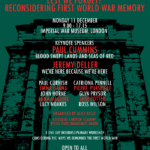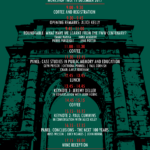Date: 31 January – 2 February 2018
Venue: Embassy of Slovak Republic (Hildebrandstraße 25, 10785 Berlin)
Conference program
Wednesday, 31 January 2018
13.30 – 14:30
Welcome address by the Ambassador of Slovak Republic, S.E. Peter Lizák
Introduction – Jan Rydel and Matthias Weber
Key Note – Jay Winter: The Second Great War, 1917–1923
14:30 – 15:00 Coffee break
15:00 – 17:00
I. The End of Empires and the Emergence of a New State Order
Chair: Martin Pekár
László Szarka: Die Alternative des Verhandlungsfriedens in Donauraum. Ungarn und die Nachbarvölker zwischen Asternrevolution und kommunistischer Machtergreifung 1918–1919
Tobias Weger: “Mitteleuropa”, “Międzymorze” and the “Little Entente”. Conflicting transnational spatial concepts in East-Central and Southeast Europe
Jochen Böhler: The Central European civil war, 1918–1921
Gennadi Korolov: “The United States between the Baltic and Black Seas” of Anton Łuckiewicz and the project of Ukrainian federation Otto Eichelman. A comparative study of federalism
Commentator: Dušan Kováč
17:00 – 17:30 Coffee break
17:30 – 19:30
II. New Beginnings and Political Emancipation (Part 1)
Chair: Robert Zurek
Burkhard Olschowsky: “Das Selbstbestimmungsrecht der Nationen“ aus der Perspektive W. I. Lenins und W. Wilsons
Michael Eric Lambert: The end of the German Empire and the emergence of the Volksdeutsche terminology
Wolfgang Templin: Versailler Scharaden. Polen und die Ukraine auf den Pariser Friedenskonferenzen
Marcela Sǎlǎgean: New beginnings and political emancipation in Romania after the First World War
Commentator: Wolfgang Hardtwig
Thursday, 1 February 2018
9:00 – 11:00
III. New Beginnings and Political Emancipation (Part 2)
Chair: Rafał Rogulski
Attila Simon: Proletarischer Internationalismus oder Nationalismus. Alternativen der Sozialdemokratie in der Slowakei nach dem Ersten Weltkrieg
Andreea Dăncilă: The Dynamics of post-war political structures in multi-ethnic regions. Transylvania at the end of 1918
Beka Kobakhidze: Paris 1919–1920: Georgia`s independence in the political West
Karolina Łabowicz-Dymanus: Granting political rights to women in Czechoslovakia, Hungary and Poland: towards gender equality or a pragmatism of national revival?
Commentator: Jan Rydel
11:00 – 11:30 Coffee break
11:30 – 13:00
IV. Social, Economic and Cultural Circumstances
Chair: Malkhaz Toria
Maciej Górny: Post-WWI East-Central Europe and the challenges of economic reconstruction, 1918–1923
Piotr Juszkiewicz: Modernism and war. The notion of regeneration in European art and architecture after WWI
Peter Haslinger: Konkurrenz im Gelände: Staatliche Interessen und lokale Lebenswelten im Kontext der ungarisch-tschechoslowakischen Grenzziehungskommission 1921–1925
Commentator: Stefan Troebst
13:00 – 14:00 Lunch
14:00 – 16:00
V. Revolutions, Counter-revolutions, Revisionism and Territorial Claims
Chair: Matthias Weber
Arnold Suppan: Cuius regio eius natio. Arguments to legitimize territorial claims against other nations` lands
Andrei Zamoiski: “Peasants wait for them with hope”: The civil war in Belarusian province 1919–1922
Ibolya Murber: Die Habsburgermonarchie, Österreich und Ungarn in der Sogwirkung der russischen Oktoberrevolution” zwischen 1917 und 1919
Rastko Lompar: The “Red Scare” in Yugoslavia: the Hungarian “Soviet republic” and the beginning of Yugoslav anti-communism 1919–1921
Commentator: Ingo Loose
16:00 – 16:30 Coffee break
16:30 – 18:00
VI. Social and psychological Consequences of the War
Chair: Bartosz Dziewanowski-Stefańczyk
Marek Syrný: Finis Hungariae – Vivat Czechoslovakia. Slovak politics and society at the edge of the 1918–1919
Rudolf Kučera: Murder and the post-war reconstruction. Czechoslovakia and Austria compared
Joanna Urbanek: From the shell shock to the Rentenneurose. Early research on war trauma in Poland, Austro-Hungary and Germany (1917–1923)
Commentator: Hannes Grandits
Friday, 2 February 2018
9:30 – 11:00
VII. Memories of the Great War
Chair: Burkhard Olschowsky
Bartosz Dziewanowski-Stefańczyk: Creation of new politics of memory as a consequence of the rebirth of a state. Case study: Poland in the first years after the First World War
Vasilius Safronovas: Non-overshadowed expressions of the First World War experiences in Lithuania (1914–1923)
Florin Abraham: Did the Great War end? Memory and memorialization of the First World War in Romania
Commentator: Attila Pók
11:00 – 11:15 Coffee break
11:15-12:00
Final lecture – Mariusz Wołos: Versailles – Stabilisierung oder Destabilisierung in Mittel- und Osteuropa?
12.30 End of the conference
Conference Organizer:
European Network Remembrance and Solidarity, Warsaw; Federal Institute for Culture and History of the Germans in Eastern Europe, Oldenburg
Partner:
University of Leipzig – Centre for Area Studies; Jagiellonian University of Cracow, Department of Historical Anthropology; Pavol Jozef Šafárik University in Košice, Department of History; Hungarian Academy of Science, Institute for Humanities, Research Center of History; Babeș-Bolyai University of Cluj-Napoca, Slovak Institute in Berlin
In cooperation with:
Embassy of Slovak Republic
Financed by:
The Federal Government Commissioner for Culture and the Media (Germany); Ministry of Culture and National Heritage of the Republic of Poland as part of the Multi-annual Program „Niepodległa“ 2017–2021
Conference languages: German and English (with translation)
Registration deadline: 25 January 2018
Register here


